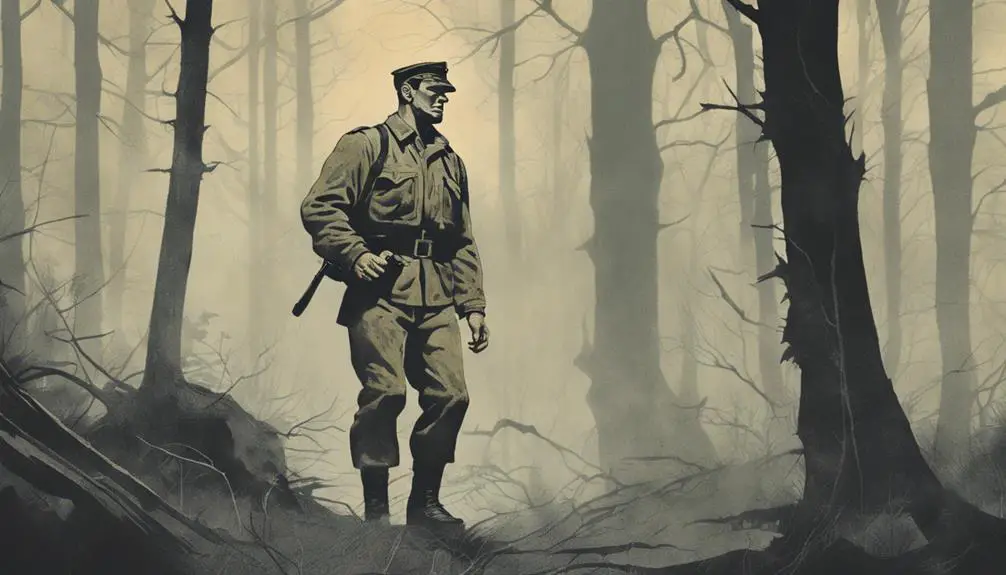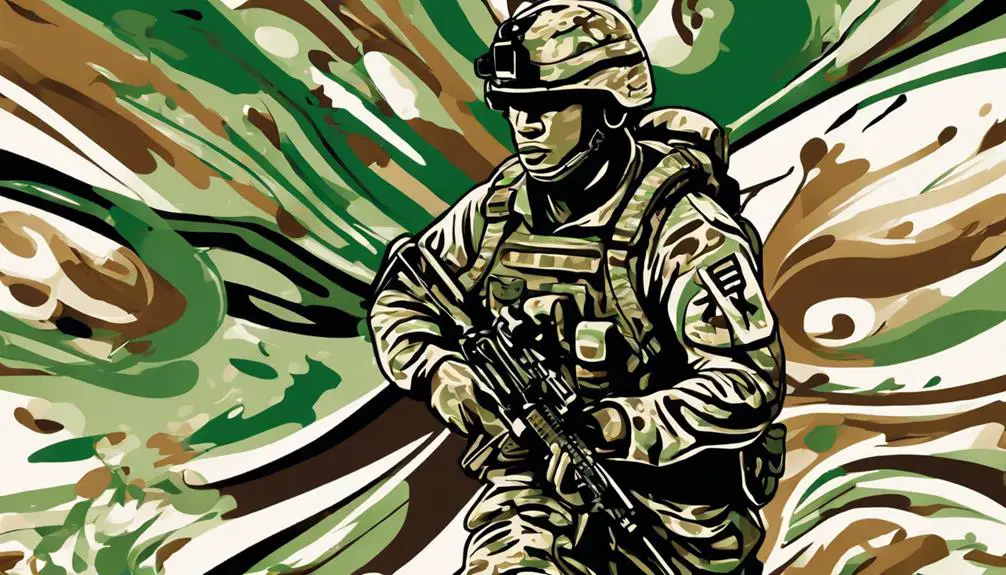You're about to uncover the fascinating story of Jody, a figure embedded in military slang. Rooted in African American folklore, Jody evolved during World War II as a cautionary tale, symbolizing distrust and deceit. This charismatic manipulator exploits soldiers' vulnerabilities, creating uncertainty and anxiety. In modern military culture, Jody permeates every level, from cadences to social media, shaping soldier identity through humor and camaraderie. But Jody's impact extends beyond the military, resonating with civilians and transcending boundaries. As you explore further, you'll discover the complexities of this legendary figure, and how its significance continues to grow.
Origins of the Jody Legend

You've probably wondered who Jody is and why he's the embodiment of the ultimate military rival, constantly trying to steal your girlfriend or wife while you're away serving your country. The origins of Jody's legend are rooted in folklore, with hints of a mythical archetype. The name 'Jody' is believed to have originated from African American folklore, where it was used to refer to a rival suitor or a seducer. This character has been present in various forms across cultures, from the 'trickster' figure in African American folklore to the 'lover' archetype in Greek mythology.
The concept of Jody has evolved over time, influenced by the experiences of soldiers during World War II. The anxiety of being away from loved ones, combined with the uncertainty of war, created the perfect environment for the Jody legend to flourish. The mythical figure of Jody symbolizes the fear of infidelity and the threat of being replaced, tapping into the deep-seated insecurities of soldiers. As a result, Jody has become an integral part of military slang, serving as a cautionary tale and a reminder of the potential consequences of being away from home for extended periods.
Jody's Rise to Infamy
As the legend of Jody spread through military ranks, his infamy grew, becoming a constant reminder to soldiers that their loved ones back home were vulnerable to his charms. You might have wondered how Jody, the Folkloric villain, rose to such notoriety.
| Jody's Rise to Infamy | Characteristics |
|---|---|
| Early Years | Charismatic, manipulative, and cunning |
| Rise to Power | Exploited soldiers' vulnerabilities, gained trust |
| Peak Infamy | Became a constant reminder of potential betrayal |
| Legacy | Solidified as a symbol of distrust and deceit |
Jody's persona was built on his ability to charm and deceive. His reputation as a home-wrecker and manipulator spread like wildfire, making him the ultimate villain in the eyes of soldiers. You can't help but wonder how one person could cause so much distress. As Jody's legend grew, so did his notoriety, cementing his place as a symbol of distrust and deceit. His rise to infamy serves as a reminder to soldiers to remain vigilant and protect their loved ones from his charms.
The Psychology of Jody

What drives Jody to exploit the vulnerabilities of soldiers and their loved ones and what psychological mechanisms enable him to masterfully manipulate those around him?
You might wonder what fuels Jody's manipulative nature. The answer lies in the complex interplay of psychological factors. Jody's power stems from his ability to tap into soldiers' deep-seated fears, leveraging Fear Factors such as abandonment, rejection, and loss. By preying on these vulnerabilities, Jody creates a sense of uncertainty, making it difficult for soldiers to distinguish between reality and fantasy.
Moreover, Jody's manipulative tactics often appeal to the traditional Masculine Identity, perpetuating the notion that a 'real man' must be strong, stoic, and unemotional. By playing on these societal expectations, Jody creates a sense of camaraderie and shared understanding, making it easier for soldiers to confide in him.
As a result, Jody gains the trust of his victims, ultimately exploiting their vulnerabilities for his own amusement. Understanding Jody's psychological mechanisms is crucial in recognizing his tactics and developing strategies to counter his manipulative behavior.
Jody in Modern Military Culture
In modern military culture, Jody's influence permeates every level of the hierarchy, from boot camp to high-ranking officials, often manifesting as a constant, underlying threat.
As you navigate the military's social landscape, you'll likely encounter Jody in various forms. You might hear cadences and chants during physical training, or see Jody-inspired memes and jokes on social media.
Jody has become an integral part of Military Entertainment, providing a way for soldiers to cope with the stresses of military life. You might find Jody-themed merchandise, from t-shirts to challenge coins, that serve as a symbol of solidarity among soldiers.
This cultural phenomenon has also shaped your Soldier Identity, as Jody represents a collective sense of humor and camaraderie that transcends rank and unit. By embracing Jody, you're signaling that you're part of the military's inner circle, with all its quirks and nuances.
As you continue to serve, you'll likely find that Jody remains a pervasive, if unofficial, part of your military experience.
Beyond the Military: Jody's Impact

Beyond the military's boundaries, Jody's cultural significance seeps into civilian life, influencing popular culture and everyday conversations. You may have encountered Jody in unexpected ways, from music lyrics to memes, and even in casual conversations with friends. As Jody's cultural significance grows, it's not uncommon to hear the phrase in civilian encounters, often used humorously or ironically.
Here are a few examples of Jody's impact beyond the military:
- Music and Media: Jody has been referenced in songs, movies, and TV shows, further increasing its cultural relevance.
- Memes and Humor: Jody has become a popular meme, often used to poke fun at the idea of someone stealing your significant other.
- Casual Conversations: You may have heard friends or colleagues use Jody in everyday conversations, often to jokingly accuse someone of stealing their lunch or parking spot.
Jody's cultural significance extends beyond the military, reflecting its ability to transcend boundaries and resonate with civilians. As you encounter Jody in your daily life, remember its origins in military slang and its evolution into a cultural phenomenon.
Frequently Asked Questions
Is Jody a Real Person or a Fictional Character?
You're wondering if Jody is a real person or a fictional character. To answer that, let's explore Jody's origin.
The truth is, Jody is a mythical figure, a symbolic representation of the rival or foil to the military personnel. There's no evidence of a real person inspiring Jody's legend. Instead, the character evolved as a way to personify the challenges and hardships faced by soldiers during training.
Can Civilians Use Jody as an Insult or Is It Military-Only?
You might wonder if civilians can use 'Jody' as an insult, or if it's exclusive to military culture.
In general, it's not recommended for civilians to adopt military slang, especially if it's used to mock or belittle. This could be seen as cultural appropriation, where a group's cultural symbols or language are used without understanding or respect.
In a civilian context, using 'Jody' as an insult might come across as insensitive or disrespectful. It's best to stick with language that's respectful and considerate of all groups.
Is Jody Used in Other Languages or Only in English?
You're wondering if 'Jody' is used in languages beyond English. Surprisingly, the term hasn't gained cross-cultural adoption, remaining largely confined to English-speaking military circles.
Language barriers have limited its spread, and cultural nuances may not translate well. While military slang often crosses borders, 'Jody' remains an English idiom, not easily adapted or understood in other languages, making it a uniquely Anglophone phenomenon.
Can Women Be Referred to as Jody in the Military?
As you step into the military arena, you're surrounded by a sea of boots and bravado. But amidst the camouflage, a question arises: can women be referred to as Jody?
In a push for gender neutrality, military inclusivity is redefining traditional terminology. While Jody was originally a masculine term, modern military culture aims for equality. Although it's not common, women can indeed be referred to as Jody, symbolizing a shift towards a more inclusive, modern military identity.
Is Jody a Universal Term Across All Military Branches?
You're wondering if a term is universally accepted across all military branches.
When it comes to 'Jody,' you'll find that it's not a one-size-fits-all term. Branch variations and service differences come into play.
While it's commonly used in the Army, its usage and connotation differ in the Navy, Air Force, and Marines.
You'll need to understand the specific context and cultural nuances within each branch to grasp the term's full meaning.
Conclusion
As you reflect on the legend of Jody, remember that his existence is a double-edged sword. On one hand, he's a symbol of the military's dark humor and camaraderie. On the other, he represents the harsh realities of war and the toll it takes on soldiers.
As you bid Jody adieu, recall the words of Roman philosopher Cicero: 'In times of war, the law falls silent.' Jody may be a mythical figure, but his impact on military culture is as real as the pain of those who've served.







